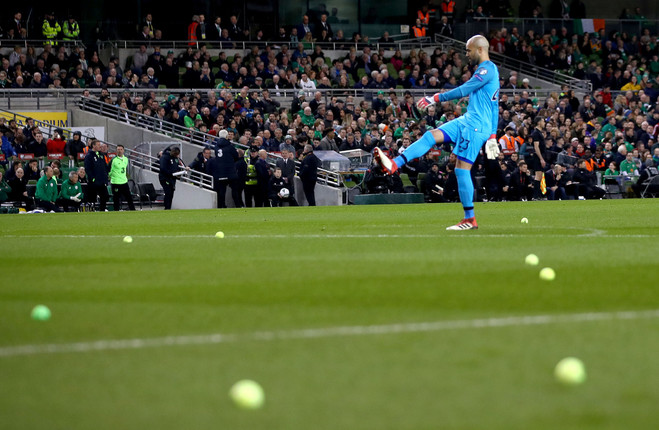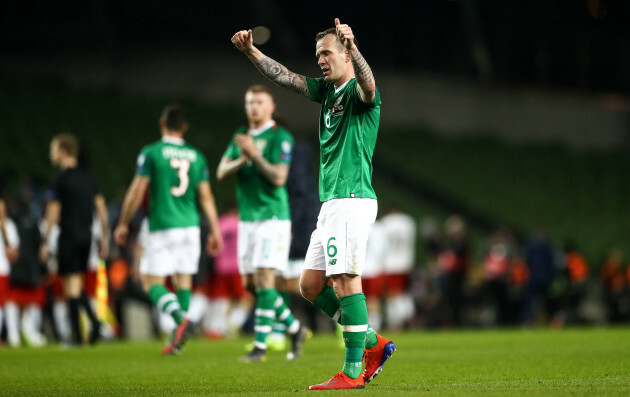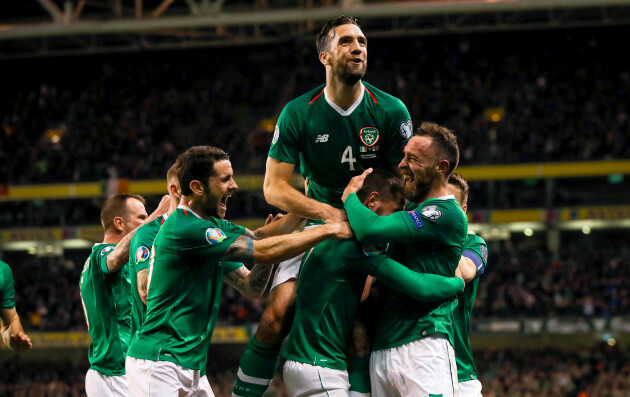1. The big problem with Irish football
THERE WAS A divide in the RTÉ studio at half-time of the Ireland-Georgia match last night.
Two former Ireland internationals, Richie Sadlier and Damien Duff, disagreed over the legitimacy of the tennis-ball fan protests that disrupted the fixture in the 33rd minute.
Duff agreed with an earlier remark made by co-commentator Ronnie Whelan that the protests were “nonsense”.
Both these two Irish legends felt nothing should distract from the focus of the all-important game.
They were not the only ones to be perturbed by the idea. Prior to the match, when asked about the possibility of a protest, James McClean came out firmly against the rumoured plan.
“Throwing tennis balls on the pitch, what does it achieve?” McClean asked.
“I think it’s pointless and stupid.
“You’ve seen it happen a few times in games and I just don’t see the point in it because throwing tennis balls on the pitch isn’t going to get someone to change.
“I just think it’s stupid, you’re just disrupting the game and I just don’t see any benefit to it whatsoever.”
Richie Sadlier, on the other hand, took an entirely opposite view and wholeheartedly supported the fans’ right to express themselves, saying they were “angry and disillusioned for legitimate reasons”.
The former Millwall player eloquently summed up why the supporters felt the need to take such measures.
“We need to keep harping on about this before the FAI or whatever delegation appears in front of the politicians, because they need to get clear answers on how Irish football is being run,” he said. “There’s a hell of a lot people who don’t come [to the Aviva] anymore because they are completely disillusioned with where Irish football is and where they believe it’s going.
“They’re looking for more meaningful change than where John Delaney parks his car outside the building in Abbotstown. They’ve created a new role for him, with no recruitment process. He got it straight away. And funnily enough, the remit of the new role is very similar to the job he just left. Actual change has to happen.”
He continued: “The makeup of the board — they’ve been together a long time, that needs to be looked at and freshened up and completely reinvigorated.
The way in which the executive is set up, whatever about the job titles — the current CEO, the interim CEO or the new CEO coming in. We’ve always gotten the sense from a distance that power in Irish football rests in one man, that the structure of Irish football and the FAI is too reliant and dependent on one man, and that’s not a healthy situation as well.
“All the stuff about the rent, [John Delaney's] wages, this is a song we’ve been singing for years, but I haven’t heard a reason that someone who does what he does justifies the wage that the board give him… Because public money goes into Irish football.”
Some people have argued that last night was not the right time or place for these issues to be brought up. Speaking ahead of the game, Mick McCarthy, who is an a difficult position given that any show of empathy with the protesters would effectively amount to criticising his employers, was among those who felt the game was an inopportune setting for such protests.
I’m not saying it because I’m back in the job, but our fans are fabulous. I want them to come and support the team and if they have to demonstrate about anything, do it somewhere else another time.”
But when and where is the right time to protest if not during a high-profile qualifier? At a League of Ireland game, where the media coverage and exposure will be limited by comparison? Out on the street, away from the cameras? It seems naive to expect those who are discontent to bite their tongue and wait for a lower-profile event, before voicing their concerns.
The argument that a Euro 2020 qualifier is more important and fans should let the players focus on the task at hand is similarly bizarre in its reasoning.
Focusing on standalone international matches and considering off-the-field issues as a matter for another day is essentially the story of Irish football for more than a decade now.
Dismissing these protests as “nonsense,” postponing concerns about how Irish football is being run and saying we should focus all our energy on one match against Georgia is the epitome of the type of short-term thinking that has afflicted the game in this country for so long.
It is apparent in the perception of the League of Ireland as “a problem child,” and the need to devote so much funding to the international team while reserving so few funds for the domestic league, as epitomised by the relatively meagre prize money afforded to the league champions.
If anything, there should be more questions asked, more protests and attempts to raise awareness of the deeper issues affecting Irish football, as opposed to ignoring all that in favour of worrying solely about winning one match against Georgia that most people will have forgotten about 10 years from now.
2. Absence makes the heart grow fonder
Not so long ago, Glenn Whelan was arguably the most criticised player in Irish football.
Yet last night, it felt as if people were belatedly starting to appreciate what he brings to the Irish side.
Some critics felt the 35-year-old’s ‘retirement’ from international football — which was really just a positive way of spinning the fact that Martin O’Neill was no longer considering him for selection — would benefit the Irish team.
Yet the side didn’t exactly thrive without the Aston Villa man, with the 4-1 Nations League loss away to Wales last year a game where his absence was particularly keenly felt. In that dismal defeat, a midfield featuring Conor Hourihane and Jeff Hendrick were regularly torn apart by their opponents in Cardiff.
Last night, Whelan was superb on his return, frequently having the positional sense to break up Georgia’s attacks, while passing the ball impressively at times to boot.
Johnny McDonnell, who coached Whelan at underage level, summed up the player’s strengths nicely in a recent interview with The42.
You knew what you were going to get with Glenn, you were getting 7/10 every match,” he said. “People think he always goes backwards and sideways — Glenn has a good range of passing. But when he plays that holding role, he does it well. He breaks things down and you can guarantee, he’ll be there for you week in and week out, and he would complement the likes of [then-Ireland team-mate] Keith Fahey.
“Glenn was a lovely fella as well. He would be the sort of fella who’d question ‘why we’re doing this?’ He wouldn’t be disruptive, but he wanted to know what was ‘the reason for doing this.’”
Last night, Whelan was one of a number of players who operated with a sense of freedom that had been conspicuously absent in the latter days of the O’Neill era, delivering an accomplished display that justified McCarthy’s decision to bring him back into the squad.
And after the match, when Whelan — who for so long infamously shunned the Irish media — agreed to do the post-match interview with RTÉ, it truly seemed like the start of a new era.
Finally, it seems, the Dubliner feels truly loved and appreciated. It only took us 11 years and 86 caps.
3. The most exciting performance since the Euros
Ireland have had better results than last night’s 1-0 victory over Georgia since Euro 2016 — the 1-0 away wins over Austria and Wales are two examples that immediately spring to mind.
However, arguably not since those famous encounters with France and Italy in that memorable summer has there been as entertaining a match that the Boys in Green have been involved in.
On Tuesday night, there was evidence on the pitch of well-conceived training-ground work and a clear plan and structure, which undoubtedly helped matters. Too often under Martin O’Neill, players went into big games looking ill-prepared and directionless, unsurprisingly delivering a disjointed performance as a consequence.
And in contrast with the negativity that was stark far too regularly during the Derry native’s tenure, against Georgia, Irish players pressed aggressively, midfielders invariably burst forward into advanced positions and full-backs consistently bombed down the touchline.
It was by no means a perfect performance. The attackers’ finishing could have been more clinical, while there were a couple of nervy moments at the back, particularly as the 90 minutes drew to a close.
But ultimately, Ireland gave their fans some much-needed reasons to be cheerful, following an exuberant team performance.
You have to go back more than three years, to November 2015 amid the Euro 2016 play-off victory over Bosnia, to recall a time where the Aviva Stadium was imbued with a similar feel-good atmosphere.
Last night, of course, was the second occasion in which Ireland have beaten Georgia 1-0 at home since that Bosnia encounter, but there was a degree of dynamism and panache about Tuesday’s display that has been virtually non-existent for much of the past three years.
Subscribe to our new podcast, The42 Rugby Weekly, here:



